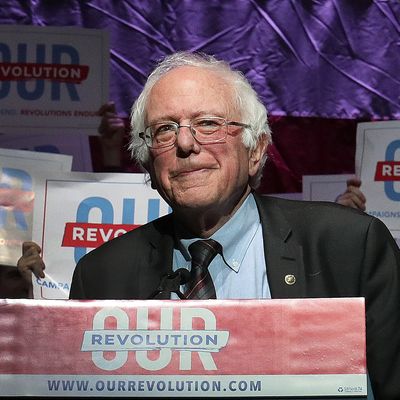
Immediately after the Republican effort to repeal and replace Obamacare failed by just one vote, Senator Bernie Sanders said he would forge ahead with his effort to dramatically shift the U.S. health-care system to the left. When CNN’s Jake Tapper asked if he still planned to introduce a Medicare-for-all bill , Sanders said, “Of course we are, we’re tweaking the final points of the bill and we’re figuring out how we can mount a national campaign to bring people together.”
Since then, Sanders has made tremendous progress on rallying prominent Democrats to the cause, but the bill he’s set to introduce on Wednesday is missing some key details; specifically, how to finance the shift to single-payer health care.
Sanders previewed his legislation, the Medicare for All Act of 2017, in an interview with the Washington Post published Tuesday night. Under the plan, America’s health-care system would be replaced by a public system. People under 18 would immediately be issued “universal Medicare cards,” and everyone else would be phased into the program over four years. Everything from mental health to prescription drugs to vision care would be covered with no co-pay, and private insurers would only exist to pay for elective treatments like plastic surgery.
This radical shift would be financed by tax increases on individuals as well as employers, which would no longer have to cover employees’ insurance. Sanders suggested Americans would be happy to pay more in taxes in exchange for stability and no longer having to do battle with health insurers. (A June Kaiser Health Tracking poll put support for Medicare for all at 57 percent, but also concluded, “The public’s attitudes on single-payer are quite malleable, and some people could be convinced to change their position after hearing typical pro and con arguments.”)
As for who would pay for his costly plan, and exactly how much, Sanders said that would be addressed in a separate bill. “Rather than give a detailed proposal about how we’re going to raise $3 trillion a year, we’d rather give the American people options,” Sanders told the Post. “The truth is, embarrassingly, that on this enormously important issue, there has not been the kind of research and study that we need. You’ve got think tanks, in many cases funded by the drug companies and the insurance companies, telling us how terribly expensive it’s going to be. We have economists looking at it who are coming up with different numbers. ”
The single-payer plan Sanders promoted during his presidential campaign would have cost nearly $1.4 trillion annually, which he said would be covered by a 2.2 income tax on all Americans and a 6.2 percent tax on employers, as well as other tax increases on the wealthy. However, critics said his numbers just didn’t add up.
How to pay for the proposed switch to single-payer is obviously a crucial question, but it’s now less significant that Sanders doesn’t have the answer. No one thinks the Medicare for All Act of 2017 is going to become law — not even Sanders.
“Look, I have no illusions that under a Republican Senate and a very right-wing House and an extremely right-wing president of the United States, that suddenly we’re going to see a Medicare-for-all, single-payer passed,” Sanders told NPR last month. “You’re not going to see it. That’s obvious.”
Sanders said the point of the bill is to start a conversation, and on that point he’s already succeeded. In 2008, none of the Democratic presidential candidates supported single-payer, but when Sanders introduces his bill on Wednesday he’ll have the support of at least 15 Democratic senators, including potential 2020 presidential candidates Cory Booker, Kamala Harris, Elizabeth Warren, Al Franken, and Kirsten Gillibrand. On Tuesday even Joe Manchin, the Senate’s most conservative Democrat, said single-payer “should be explored” (though hours later he walked that back, saying he’s “skeptical” that it’s the right solution).
Democratic leaders Nancy Pelosi and Chuck Schumer don’t back Sanders’s bill, and some argue that the Democrats are making a huge mistake by launching into another treacherous health-care debate after just barely saving Obamacare. But for better or for worse, Sanders has officially managed, with astonishing speed, to make “Medicare for all” a mainstream Democratic policy.






























